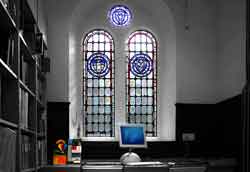 It has never been easier to visit a mainline Christian church. You don’t even have to make human contact, thanks to the Internet. And since there are now more people who claim no religious affiliation than there are Methodists (the largest mainline denomination), if these “nones” want to one day explore mainline Christianity, they will probably take their first step online. Churches know this, of course, and have a lot riding on their web presence.
It has never been easier to visit a mainline Christian church. You don’t even have to make human contact, thanks to the Internet. And since there are now more people who claim no religious affiliation than there are Methodists (the largest mainline denomination), if these “nones” want to one day explore mainline Christianity, they will probably take their first step online. Churches know this, of course, and have a lot riding on their web presence.
Denominations and Churches
Surf around the major mainline denominations’ websites and you will get a feel for this presence. The United Church of Christ just launched a social networking community called “myUCC” designed to link members and friends up “facebook style;” the United Methodist Church has a new slogan--to “serve God and save the planet;” the Episcopal Church of America features a YouTube campaign called “I am Episcopalian” highlighting its diversity; Lutherans have a seasonal devotion on their home page designed to entice you to find a local congregation for the full experience; Presbyterians offer daily meditations with John Calvin; Mennonites have a historical reflection on what it is like to follow Jesus in a world that does not; and the Disciples of Christ are holding a World Café for Wholeness at their upcoming General Assembly. On each site there is a way to find a church near you, statements on faith and ethics, and information about mission priorities.
Individual church websites—almost every church has one---vary widely in quality and offering. Some are simply brochure information pasted into a web page—boring and uninviting. Others are as slick as a Starbucks site, angling for the “iPod crowd” --people born after 1982 who have never known life without a computer. Church websites frequently include audio or video of sermons and almost always provide a way to contribute financially to the church.
Devotional and Study Sites
Whether you want to read, study, pray or meditate, there are multiple websites to visit. A library of essays for reflection and ideas for prayer are on www.explorefaith.org, a site featuring contributors such as Marcus Borg and Phyllis Tickle. For an exploration of twelve important Christian spiritual practices and ways to keep them, there is www.practicingourfaith.org. The Upper Room provides daily devotions from a mainline perspective, and if you enjoy studying the daily lectionary from your computer or Blackberry, you can find the day’s passage on most denominational sites (try www.pcusa.org/lectionary). For the latest in religion commentary, magazines such as Christian Century and Sojourners put a lot of their print content online. It’s easy now to find Christian classics in the public domain — things like Jonathan Edward’s "Treatise on Grace" or John Wesley’s journals — at the Christian Classics Ethereal Library (www.ccel.org) which has a long list of downloadable documents for reflection and study.
Spiritual Assistance
The web is a good way to plan a retreat or find a spiritual guide. Most retreat centers have websites that show you what they look like, what they offer, and their rates. Two sites that pull that information together for you are Find the Divine and Seek a Retreat. To find a spiritual director for long term assistance or to guide your private retreat, go to Spiritual Director’s International and use their “Seek and Find” guide.
The Promise and the Pitfall of the Web
The promise of the web is that there is no quicker, easier way to disseminate information for study, prayer and reflection, or for promoting what churches are doing to spread the faith. Websites and blogs allow churches and individuals to clearly state who they are and what they believe. Online information speeds networking within and between denominations.
Religion on the web falls short in a couple of areas. First, not all online information is accurate since everyone edits their own material. Let the seeker beware. But more importantly, interaction with a computer screen can never replace the experience of people gathered to share their faith. You can have an individual experience of God alone at your computer but you will not have a communal experience of God that way. It is in community that we test our faith and our insights from God. So while the Internet can be a support, if you really want to know about mainline Christianity, you have to eventually log off the computer and put in some face time with an actual church.
8/17/2009 4:00:00 AM





